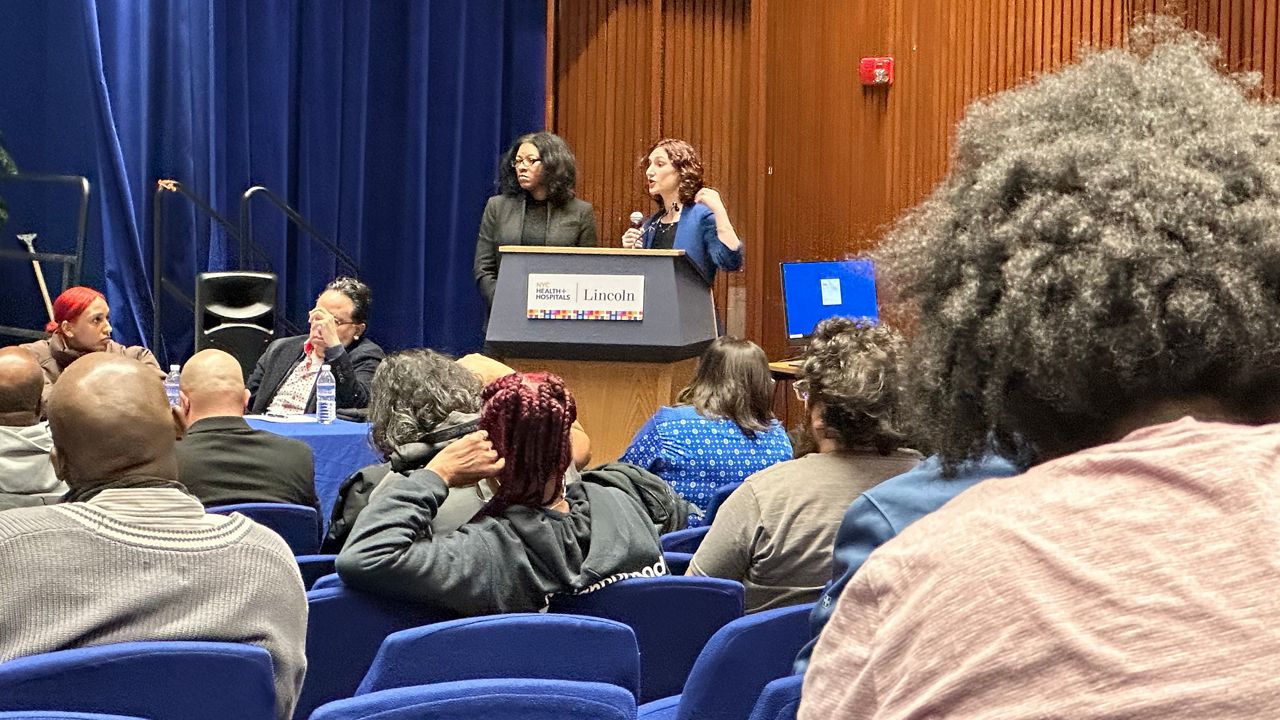Catholic Charities held a free legal clinic in the Mott Haven section of the Bronx Wednesday.
More than 100 immigrants and newly arrived migrants were able to obtain legal assistance for issues such as citizenship and asylum at the clinic.
What You Need To Know
- Catholic Charities held a free legal clinic in the Mott Haven section of the Bronx Wednesday
- More than 100 immigrants and newly arrived migrants were able to obtain legal assistance for issues such as citizenship and asylum at the clinic
- Members of the Immigrant and Refugee Services team for Catholic Charities offered information, free legal consultations for immigration and other needs regarding people who are documented and undocumented
- The city said it has opened four legal clinics to help migrants with their applications for asylum and work authorization among other things
Speaking through a translator, Lesle Amezquita said she, her 7-year-old son and her partner were held hostage in Mexico during a terrifying journey from her native Guatemala to the U.S.
“Even on our journey, we were held hostage before we were let go and they asked family members to send money over for our ransom,” she said through her translator.
Amezquita said eventually their captors let them go, and they arrived in the city in November 2023.
She went to the legal clinic held at St. Luke’s Church to apply for asylum and permission to work legally in the country.
“My desire is to look for a job to sustain myself,” Amezquita said. “At the moment, I’m not able to work documentation and work permits.”
The city said it has opened four legal clinics to help migrants with their applications for asylum and work authorization, among other things.
So far, the city has helped complete 12,234 asylum applications, 15,848 work authorization applications and 10,970 TPS applications.
However, Mayor Eric Adams has been asking the federal government to speed up work authorizations — saying migrants admitted into the country by federal authorities who put them on parole, or temporary permission, to stay in the city and can immediately apply for work authorization. Meanwhile, migrants who enter without permission from federal authorities cannot.
The mayor’s office said some migrants can immediately apply for work authorization if they’re admitted into the country by federal authorities who put them on parole, or temporary permission to stay in the city, but not migrants who enter without permission from federal authorities.
Members of the Immigrant and Refugee Services team for Catholic Charities offered information and free legal consultations for immigration legal services and other needs regarding people who are documented and undocumented.
“A lot of the people that were seeing are in deportation proceedings meaning that they need to go to immigration court and speak with the judge to determine if they have legal status and we have other people who do not have an immigration court case and are still wanting to know if they have an option for obtaining legal status in the future,” Lauren Wyatt, attorney for Catholic Charities Immigration, said.
Elizabeth Leiton said she came to the city from Colombia approximately nine months ago with her 10-year-old son and husband.
“Oh God, this is crazy. I mean the changes, the cultures are totally different, like the anxiety of being able to find a place in here and that everything is going to be OK, like getting a legal status. [It] is a little difficult,” she said.
As for Amezquita, unlike more than 60,000 other new arrivals, her living expenses are taken care of. Her family is staying with her aunt,. However, she still needs to work to support her 13-year-old daughter back home.
“I am not relying on the government to feed me or to give me any type of resources,” she said through her translator.
The Adams administration said federal immigration officials have the authority to grant parole for longer periods of time and more consistently, which the mayor’s office said would allow migrants to apply for work authorization and find work more quickly.


_CGPKG_Catholic_Charities_Legal_Clinics_for_Migrants_CG?wid=320&hei=180&$wide-bg$)

